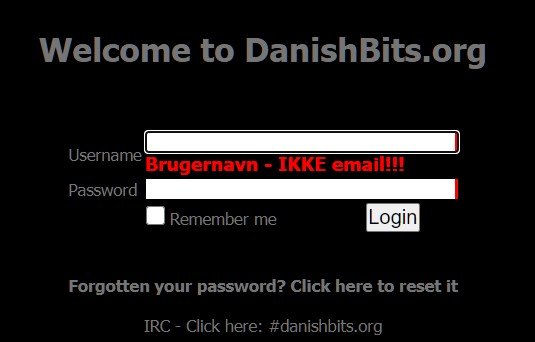-
chevron_right
Danish Torrent Tracker Crackdown Leads to Another ‘Mild’ Sentence
news.movim.eu / TorrentFreak · Friday, 5 April - 18:54 · 3 minutes
 Private torrent trackers with Danish roots have long been the go-to place for file-sharers in Denmark. Not anymore.
Private torrent trackers with Danish roots have long been the go-to place for file-sharers in Denmark. Not anymore.
Starting in the fall of 2020 , Danish law enforcement toppled several thriving torrent communities.
With help from local anti-piracy group Rights Alliance , DanishBits, NordicBits, ShareUniversity, Asgaard and others were systematically dismantled.
Sting Operation
When the first trackers fell, preparations for the operation had been ongoing for years. It all started when a former lawyer working for Rights Alliance went undercover at the private tracker DanishBits in 2016. As a quiet user, the infiltrator mapped the site’s internal relationships and identified key individuals in the wider Danish tracker ecosystem.
The details of this sting operation read like a film script but for many involved, it turned into a real-life drama. Not only were several trackers subsequently shut down, a number of community members were prosecuted too. More than two dozen people, from prolific uploaders to ringleaders, all had their day in court.
After the tracker dominoes fell, more than two dozen suspects were investigated and taken to court. This resulted in a wide range of sentences, with most of the tracker admins receiving conditional prison sentences of a few months. Some were ordered to carry out community service.
Conditional Prison Sentence
This week, the National Unit for Special Crimes ( NSK ) announced the final sentence related to the ‘Asgaard’ tracker. The Court in Horsens sentenced a 48-year-old man from East Jutland, who pleaded guilty to copyright infringement, to a suspended prison sentence of 60 days.
The defendant was the last of seven Asgaard tracker administrators to go before the court. The man helped to get the torrent site off the ground in 2019 and served as an admin of NordicBits before that; both offenses were accounted for in the conviction.
Asgaard became immensely popular in Denmark toward the end of 2020, after DanishBits and NordicBits shut down. The site had an estimated 1.5 million monthly visits at its height, making it the biggest pirate site in the country for a while.
Harsher Punishment Wanted
The guilty verdict is good news for Rights Alliance, but a bittersweet victory. While the crackdown effectively decimated the torrent tracker problem, the sentences handed down have been relatively ‘mild’. The tracker operator and many other “ringleaders” don’t have to serve time in prison, as the sentences are conditional.
Rights Alliance Director Maria Fredenslund notes that copyright and IP-related crimes are historically not viewed as severe crimes in Denmark, adding that a tougher sentence would be more effective.
“Sentences for IP crime are in general too low in Denmark, to have a sufficient deterrent effect. We believe the sentences in many cases should have been much harder,” Fredenslund informs TF.
“The reality is that IP crime has not been seen as a severe crime in Denmark historically, so we are starting from a low point and building from there to obtain adequate sentencing that will keep others from committing similar crimes.”
NSK prosecutor Hans Bohn Sørensen is content with the verdict, however, which marks the end of the Asgaard prosecution.
“I am satisfied with the verdict, which now ends the proceedings against the founders and administrators behind one of the largest illegal file sharing services we have had in Denmark,” Sørensen says.
Threat Neutralized?
The recent sentence and those that were handed down earlier are not the harshest on a global scale and unlikely to spook hardened criminals. However, deterrence is not solely determined by the harshness of a punishment .
Another factor that plays a key role is the likelihood of getting caught. With a multi-year crackdown on several trackers, Danish police and NSK have shown that this risk is, perhaps, higher than ever.
Commenting on this aspect, Fredenslund praises the authorities’ invaluable efforts, which helped to ensure that Danish file-sharing services no longer pose a significant threat to Danish rights holders.
Of course, new trackers will always emerge but Rights Alliance sees these as marginal problems in the grander scheme.
“The current trackers only harbor the very hardcore illegal users in Denmark. They don’t pose a threat that’s comparable to Asgaard, ShareUniversity, DanishBits, etc.,” Fredenslund notes.
With the final conviction of the last Asgaard admin, all cases related to the tracker are closed. Cases against other trackers are still pending, however. In the meantime, Rights Alliance maintains its focus on emerging threats, including those related to Artificial Intelligence.
From: TF , for the latest news on copyright battles, piracy and more.



 Last Thursday, a Danish court sentenced a 24-year old programmer from Silkeborg to 60 days probation for his role in operating the torrent tracker ShareUniversity.
Last Thursday, a Danish court sentenced a 24-year old programmer from Silkeborg to 60 days probation for his role in operating the torrent tracker ShareUniversity.


 Obtaining a proper education can give people a leg up in life, but this privilege does come at a price.
Obtaining a proper education can give people a leg up in life, but this privilege does come at a price.
 Piracy is by no means exclusive to any particular generation but among the general public, it’s often associated with younger people.
Piracy is by no means exclusive to any particular generation but among the general public, it’s often associated with younger people.

 Free access to information is a broadly held ideal, but when students have to pay for their textbooks, it’s far from reality.
Free access to information is a broadly held ideal, but when students have to pay for their textbooks, it’s far from reality.


